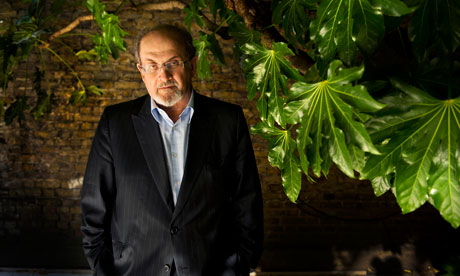
Rushdie’s new memoir takes its name from the pseudonym he used while in fear for his life. Photograph: Linda Nylind for the Guardian
Salman Rushdie is ready for his next role. "I'll be Marlon Brando in a turban," he says. His friend Deepa Mehta, who has just directed the author's adaptation of the Booker-winning novel Midnight's Children, wants Rushdie to play an ageing godfather in her new movie, set among western Canada's feuding Sikh gangs.
"I really want to do it," he says. "It'll be Tarantino with brown people." It is not the first time Rushdie has been offered a menacing film role. Paul Auster asked him to play a sinister interrogator who gives Harvey Keitel the third degree in Lulu on the Bridge. Alain Robbe-Grillet urged Rushdie to play a suspicious doctor who tended to Jean-Louis Trintignant's crashed pilot in the Cambodian jungle. "Maybe they saw something evil in me," he laughs as we talk at the Bloomsbury offices of his literary agent.
Rushdie turned those film roles down, but did play an approximation of himself in the 2001 movie Bridget Jones's Diary at the suggestion of novelist Helen Fielding. He was never asked to play himself in the 1990 Pakistani film International Gorillay, about jihadists who vow to kill an author called "Salman Rushdie". At the end of the film, "Rushdie" is terminated, not by jihadists, but by three large Qur'ans hanging from the sky that reduce him to dust in punishment for slurring Islam in his novel The Satanic Verses. The real Salman Rushdie played a key role in ensuring that film's UK release: Britain's film censors were set to refuse it a certificate because it was inflammatory, but Rushdie assured them he wouldn't sue for libel and so it was released. "It was a piece of crap but banning it would only have glamorised it," he says.
I take a sidelong glance at Rushdie, looking for the devil in the 65-year-old writer. His goatee recalls venal drug kingpin Fernando Rey's in The French Connection. His eyelids still droop slightly despite an operation for ptosis a few years ago and his eyebrows point diagonally to the bridge of his nose. He could use these natural assets to make himself look diabolical, but not today.
We are meeting to discuss Rushdie's longest-running role, his 13-year performance as a character called Joseph Anton. This was the pseudonym he took after going into hiding following the fatwa declared upon him by Iran's Ayatollah Khomeini on Valentine's Day 1989. His protection officers suggested he choose another name to increase his security when he turned up at a new home (though being flanked by four armed men in bulletproof Jaguars usually did the trick). "Probably better not to make it an Indian name," counselled his minder Stan. And so, Rushdie writes, he became "an invisible man in a whiteface mask". Joseph was Conrad's first name, Anton was Chekhov's. He was Mr Anton until March 27 2002, when the police Jaguars finally drove out of his life for the last time.
Full piece at The Guardian
"I really want to do it," he says. "It'll be Tarantino with brown people." It is not the first time Rushdie has been offered a menacing film role. Paul Auster asked him to play a sinister interrogator who gives Harvey Keitel the third degree in Lulu on the Bridge. Alain Robbe-Grillet urged Rushdie to play a suspicious doctor who tended to Jean-Louis Trintignant's crashed pilot in the Cambodian jungle. "Maybe they saw something evil in me," he laughs as we talk at the Bloomsbury offices of his literary agent.
Rushdie turned those film roles down, but did play an approximation of himself in the 2001 movie Bridget Jones's Diary at the suggestion of novelist Helen Fielding. He was never asked to play himself in the 1990 Pakistani film International Gorillay, about jihadists who vow to kill an author called "Salman Rushdie". At the end of the film, "Rushdie" is terminated, not by jihadists, but by three large Qur'ans hanging from the sky that reduce him to dust in punishment for slurring Islam in his novel The Satanic Verses. The real Salman Rushdie played a key role in ensuring that film's UK release: Britain's film censors were set to refuse it a certificate because it was inflammatory, but Rushdie assured them he wouldn't sue for libel and so it was released. "It was a piece of crap but banning it would only have glamorised it," he says.
I take a sidelong glance at Rushdie, looking for the devil in the 65-year-old writer. His goatee recalls venal drug kingpin Fernando Rey's in The French Connection. His eyelids still droop slightly despite an operation for ptosis a few years ago and his eyebrows point diagonally to the bridge of his nose. He could use these natural assets to make himself look diabolical, but not today.
We are meeting to discuss Rushdie's longest-running role, his 13-year performance as a character called Joseph Anton. This was the pseudonym he took after going into hiding following the fatwa declared upon him by Iran's Ayatollah Khomeini on Valentine's Day 1989. His protection officers suggested he choose another name to increase his security when he turned up at a new home (though being flanked by four armed men in bulletproof Jaguars usually did the trick). "Probably better not to make it an Indian name," counselled his minder Stan. And so, Rushdie writes, he became "an invisible man in a whiteface mask". Joseph was Conrad's first name, Anton was Chekhov's. He was Mr Anton until March 27 2002, when the police Jaguars finally drove out of his life for the last time.
Full piece at The Guardian
No comments:
Post a Comment